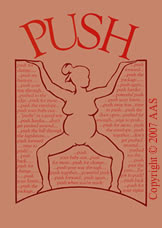http://hospitalbirthdebate.blogspot.com/2006/12/pictorial-history-of-betrayal.html and http://hospitalbirthdebate.blogspot.com/2006/12/betrayal-of-women_5949.html
Many physicians -- even females -- can not acknowledge that women can experience violation and feelings similar to being raped during hospital birth. Here we have an male physician describing graphically that it certainly does happen and how. Check out the appendixes. It is good to remind readers here of the new scientific findings that explain how it is that the body remembers everything, even when the body is drugged.
The following article brings up many things to think about --- the state of medical education, the history and truth of informed consent, the use of drugs in birth, and how the body remembers everything and how these "unconscious memories" get acted out in other situations.
Heart Failure - Miscarriage of Justice
by Michael Greger, MD and United Progressive Alumni
[ Medical School Resources Appendices Discussion ]
IV. OBSTETRICS AND GYNECOLOGY - February 16-March 27
Miscarriage of Justice
Back in the hole. First day and furious at the garbage they're teaching. "All postmenopausal women must be on hormone replacement. It's imperative. They're crazy if they're not." What a coincidence, lunch brought to us by Premarin*. Grand rounds or infomercial?
* Premarin is a brand name of "hormone replacement therapy." It is now one of the most commonly prescribed drugs in the U.S. Premarin is inhumanely derived from the urine of confined and catheterized pregnant mares.
Appendix 48 documents some of the industry's hormone marketing tactics.
"Anesthetized women look so vulnerable."[119]
I am all gloved up, fifth in line. At Tufts, medical students - particularly male students - practice pelvic exams on anesthetized women without their consent and without their knowledge. Women come in for surgery and, once they're asleep, we all gather around; line forms to the left.
In the medical ethics literature this practice has been called, "an outrageous assault upon the dignity and autonomy of the patient...."[120] "The practice shows a lack of respect for these patients as persons, revealing a moral insensitivity and a misuse of power."[121] "It is just another example of the way in which physicians abuse their power and have shown themselves unwilling to police themselves in matters of ethics, especially with regard to female patients."[122]

We learn more than examination skills. Taking advantage of the woman's vulnerability - as she lay naked on a table unconscious - we learn that patients are tools to exploit for our education.
It all started on the first day when the clerkship director described that we were to gain valuable experience doing pelvic exams on women in the operating room. I asked him if the women knew what we were doing. Are the women asked permission? "No," he said. And not only no, he described that he was, "ethically comfortable with that." I did some reading.
Massachusetts state law reads: "Every patient... has the right... to refuse to be examined... by students... and to refuse any care or examination when the primary purpose is educational or informational rather than therapeutic."[123] Yes, the right to refuse, but what if the patient doesn't even know? Was the director's attitude what-she-doesn't-know-can't-hurt-her? The confrontation continued.
He countered, "These women sign off that right to refuse on their surgical consent form." Having long learned a healthy skepticism about the pronouncements of authority, I got a copy of the form. The only mention of students reads as follows: "I am aware that occasionally there may be visiting surgeons/ healthcare professionals/ students observing techniques." Observing? We were going to be doing a lot more than observing. I went back to talk to him.
"Women are smart," he told me. "They know that when it says a student observes, that the student will be participating in the procedures." My eyes widened. And anyway, I was told, "Most women wouldn't mind." My jaw dropped. And, "Why are you so sensitive?"
I was just stunned, a stranger in a strange land. I was reminded of the summer I spent in Louisiana, where I had a debate with an orthopedic surgeon over whether or not the abolishment of slavery was really a good thing. "Now just think about it," I was admonished. What do you even say? How do you even respond?
So if the patients already secretly know and wouldn't mind regardless, then surely the course director wouldn't mind me wasting my breath to ask the women permission. (For that matter, he shouldn't mind a quick letter to the Boston Globe either.) No, I was told initially, I am not to ask women permission to use them - their bodies - for our education. I shouldn't let them know. Why? "We would just confuse the patients," he said. "You don't ask permission for male genital exams, do you?" I was asked. "We don't get them to sign permission for every little detail?"
John M. Smith, in Women and Doctors writes, "Many doctors regularly abuse women as a result of underlying prejudice and self-deception."[124][125]
"It is grossly unjust to exploit the vulnerable."[126]
Maybe the women wouldn't mind not being asked. After all, he is a doctor. I went back to the library. Sixty-nine women were asked in a British survey whether they thought permission should be specifically sought for students doing pelvic exams in the operating room. One hundred percent said yes; they all thought that specific permission should be sought.[127] A Swedish study found that 90% of gynecologic patients "would feel aggrieved if they discovered that they had participated in [any kind of] clinical training without first having been informed or given the opportunity of declining."[128] And of course, "Express consent does not mean a signature on a piece of paper... [it means] the patient must understand the general nature of the procedure - that is, that she is being used for teaching."[129]
I brought this to the director's attention. I gave him a copy of the British study. He dismissed it; how could I possibly extrapolate data from a British low income clinic to our population? Again, speechless. Even if the data were two orders of magnitude off and only one out of a hundred would mind not being asked, shouldn't that be enough?
The practice may even put the school and hospital in legal jeopardy - battery, professional misconduct, perhaps even aggravated sexual assault. Maybe I should just walk out of the OR and call the police. As written in a British Sunday Times article, "There is nothing to stop a woman bringing a legal action of assault. The only reason no one has done it is because they don't know what's going on."[130] The attending assured me they had thought of that too. "It's been past the risk analysis committee," he told me as he patted my shoulder, "there's nothing to worry about." At that point I gave up.
Appendix 49 (http://upalumni.org/medschool/appendices/appendix-49.html) offers some perspective on this outrageous practice.








No comments:
Post a Comment